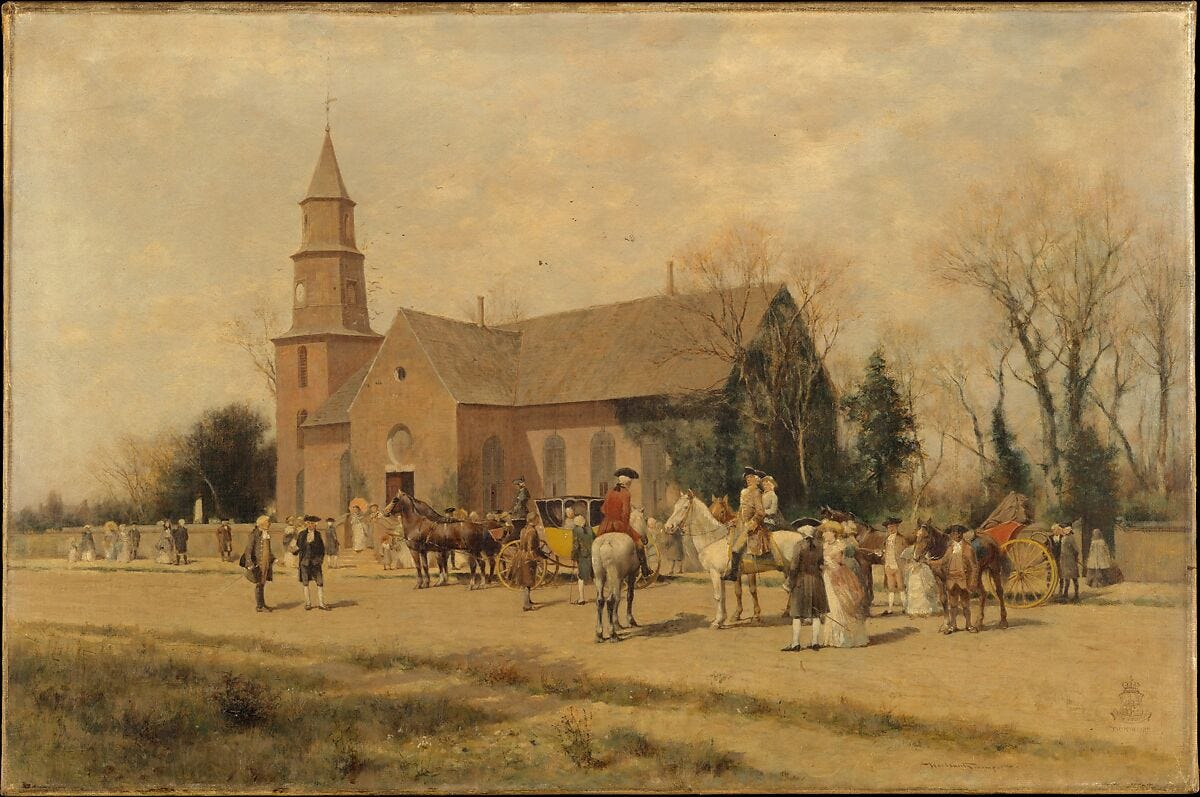The Debt of Thomas Jefferson
A Cautionary Tale
EXECUTOR’S SALE will be sold on the premises, on the first day of January, 1827
The nation’s third President had been dead six months. He had written the country’s foremost document, had expanded the interest in husbandry throughout the states, and had brought the Southern ideal to the national stage. Thomas Jefferson was dead and his estate was being sold.
His grandson, Thomas Jefferson Randolph, the executor had the task of settling his affairs. Randolph was to sell off the house, the grounds, the slaves, the crops, the household goods, whatever was Jefferson’s. Famed paintings and sculptures of the legendary Monticello were auctioned off. Thousands flocked to the sale to get their hands on something once owned by the premier man of Albemarle County. But why did it have to be sold? Why couldn’t it stay in its place like every other famous estate?
Jefferson was deeply in debt. When he died he had accumulated well over $107,000 of various debts, which is the equivalent of about $3.4 million today.1 Despite his well-known and outspoken beliefs about public and private debt, he struggled with it.
Shortly before his death he wrote, “The wonder…is that I should have been so long as 60 years in arriving at the ultimate & unavoidable result.”2 This was not just the lamentable regret of an old man, he wrote of his debts 40 years prior, “I am miserable till I owe not a shilling.”3
Jefferson’s personal acquisition of debt shows how champions of ideals have contradictions and how those ideals are still worth pursuing, through the contrast between his principles and his reality and it serves as a warning to those who live above their means and are not mindful of their situations, through his acquisition of debt and the consequences issuing from it.
The Beliefs

If this was what Jefferson did, which contradicted his many statements about it, then what exactly did he believe? Certainly his views on public debt are well-known. During the constitutional debates of the 1780s between the Federalists and the Anti-Federalists, public funding was a topic of question.
In The Anti-Federalist Papers, Brutus, the pseudonym of New York delegate Robert Yates, writes, “I can scarcely contemplate a greater calamity that could befal this country, than to be loaded with a debt exceeding their ability ever to discharge.”4 With this Jefferson agreed.
Jefferson ascribed to the long-held Southern belief, derived from the Scriptures, that debt enslaves the borrower to the lender. He expounds this by writing, “I am not among those who fear the people. They, and not the rich, are our dependence for our continued freedom. And, to preserve their independence, we must not let our rulers load us with perpetual debt.”5
His opinions about private debt are not explicit, however it is easy to deduce that they are the same when he says, “the accumulation of debts is a most fearful evil.”6 This statement reflects the common conviction the Southern states held before, contemporaneously with, and after him.
One Southerner who carried Jefferson’s torch of convictions and ideals was John Taylor of Caroline, the Virginia delegate and United States Senator. During the early 19th century and America’s debts of the rights of state and federal powers, Taylor wrote the book Tyranny Unmasked, in which he warned against the ever-increasing authority of the federal government. As a Jeffersonian and close friend of the man, he advocated for the unhampered and distinguished powers of the states.
In Tyranny Unmasked he writes this on debt:
“The Committee inform (sic) us ‘that the true economy of individuals, is to earn more than they spend; het this said to be bad policy for a nation. The first assertion is universally known to be true; but the second is gratuitously and unfairly attributed to their adversaries, to discredit the very principle by which only the first assertion can be realized, namely, that industry should be free to save as well as earn.”7
The Southerners saw the true danger of a large government as it would interfere with the free economic production of the citizens by the unlimited powers to acquire debts. The ever-so increasing federal government would extend itself as a green laurel tree and the citizens would be enslaved to foot the bill.
For the South, small government meant that the citizens would be protected and free to work, to live below their means, and to save money for their private accumulation of wealth. In sum, debt meant to the South the end of individual freedom.
Jefferson’s Acquisition of Debt
Thomas Jefferson’s acquisition of debt was not the result of a singular cause. In 1991, Lucia C. Stanton, historian and Thomas Jefferson researcher, summarized it into four factors8:
1. Inheriting His Father-In-Law’s Estate
Not all of Jefferson’s was his own. When his father-in-law died in 1773, he inherited his estate with all of his debts. In the colonial period, debts favored the creditor, and with his father-in-law’s creditors being in England, interest accrued quickly given the months it would take for messages to cross the Atlantic. Despite selling the estate the following year, the assets did not satisfy the liabilities so the result was that Jefferson carried the debt for the remainder of his life.9
2. Farming Losses
Jefferson loved farming. He enjoyed working the land and its fruit, but it was unreliable and insufficient for him to live off of it because of his lifestyle. The land and the slaves attributed to much of his wealth, but farming did not. As Andrew Lytle in I’ll Take My Stand says, “A farm is not a place to grow wealthy; it is a place to grow corn.”10
3. Living Beyond His Means
The President loved European culture. His intrigue began with the Enlightenment but deepened during his time as an American diplomat to France. During his first term in the White House he spent more than $7,500 on French and Italian wine, which is more than $200,000 today.11
His construction of Monticello began in 1768, which was mostly completed in 1771, but it underwent multitudes of redesigns and renovations that finally ended in 1809. The forty year project cost Jefferson more money than what he originally figured. For this he went further into debt.
4. Endorsing the Debts of Others
In the last years of his life, Jefferson personally endorsed a $20,000 note for a close friend. Two years later the friend died unexpectedly, leaving Jefferson with the unpaid debt. The note would be worth over $500,000 today.12
During this time the nation faced financial panics due to underpromising investments in the new American west. This caused interest rates to spike, leaving Jefferson with increasingly mounting balances.
The Consequence
By 1826 Jefferson and his grandson, Thomas Jefferson Randolph were thinking of ideas for how to pay off the debts and they came up with the idea of a public lottery. It had been done before in the state so Randolph set off for Richmond.
He labored for months to promote a bill in the legislature. Despite its setbacks and opposition, Randolph continued to fight for it. Eventually it was passed, stating that Jefferson may “dispose of any part of his real estate by lottery, for the payment of his debts.”13
So the plans of the lottery were drawn up, assets were valued, and tickets were ready to be punched. But Randolph did not do one thing. He did not give up total control to the brokers he had hired. He got emotionally attached to the sale.
The plans fell apart as Randolph and the brokers did not cooperate. The were only able to raise a fraction of the money needed to satisfy the debt. By this point Thomas Jefferson died.
In early 1827, Randolph hosted the executor’s sale which also did not suffice. The house and the grounds had deteriorated in recent years as the funds were being directed towards the debt, causing them to get less than what they had expected. After Monticello was on the market for 5 years, it was sold for a tenth of the listing price. It was not until 50 years after Thomas Jefferson’s death that the last payment on his debt was made.
His daughter, after selling Monticello, lived in poverty, and eventually moved in with her son and depended on him for support.
After a long and detailed history, Monticello was purchased by the Thomas Jefferson Foundation in 1923 and has remained in their possession since.
The Caution
Despite Jefferson’s outspoken beliefs, he was conquered by debt. The story only ends well because Monticello was eventually redeemed.
His debt displays the tension often seen between one’s ideals and their reality, and serves as a warning to those in debt.
As an accountant I have seen stories like this time and time again. I have seen people making $600,000 a year live paycheck to paycheck. I have seen couples with a $500,000 line of credit but only $200 in their checking account. Clients have screamed at me over $300 they have to pay to the government when they make $100,000 a year. Like Jefferson, they each have fallen victim to lifestyle creep and live beyond their means.
As someone who is completely debt-free, the feeling you experience when the final payment is made cannot be described or imagined beforehand. But when you owe no one anything, there is an unspeakable peace that comes over you. It is the feeling of you as a slave being released from your master, the debt.
Whatever it takes to get debt-free, it is worth it. Fight hard, and finish well.
Used this inflation calculator: https://www.officialdata.org/us/inflation/1826?amount=107000
Letter from Thomas Jefferson to Francis Eppes (1826). Read the transcript here: https://rotunda.upress.virginia.edu/founders/default.xqy?keys=FOEA-print-04-02-02-5954
Letter from Thomas Jefferson to Nicholas Lewis (1786). Read the transcript here: https://founders.archives.gov/documents/Jefferson/01-10-02-0466
Brutus’ No.8, The Anti-Federalist Papers. https://constitution.org/1-Constitution/afp/brutus08.htm
Letter from Thomas Jefferson to Samuel Kercheval (1816). Read the transcript here: https://teachingamericanhistory.org/document/letter-to-samuel-kercheval/
Letter from Thomas Jefferson to William Carmichael (1787). Read the transcript here: https://founders.archives.gov/documents/Jefferson/01-12-02-0171
“For the next 53 years, the debt would remain unpaid. This burden was a constant companion for Jefferson throughout the Revolutionary War, his term as vice president, his two terms as president, and his entire retirement.” Pulled from here.
The Hind Tit by Andrew Lytle, I’ll Take My Stand: The South and the Agrarian Tradition. Louisiana State University Press. Louisiana Paperback Edition. 1977. Page 205.
Used this inflation calculator: https://www.officialdata.org/us/inflation/1804?amount=7500
The text of the bill was printed in Niles' Weekly Register for March 18, 1826. Hezekiah Niles, Niles' Weekly Register 3rd ser., no. 3, vol. VI (Baltimore: Franklin Press, 1826), 35.




